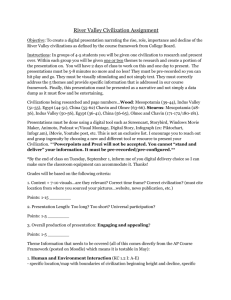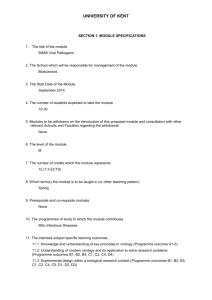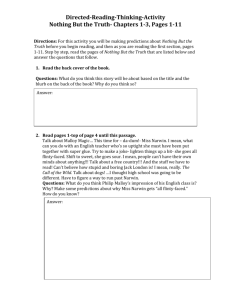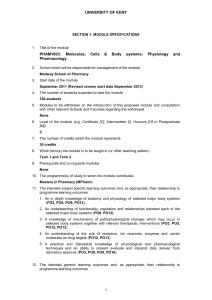2014ElectionsQuickFacts (2014 Gubernatorial Elections)
advertisement
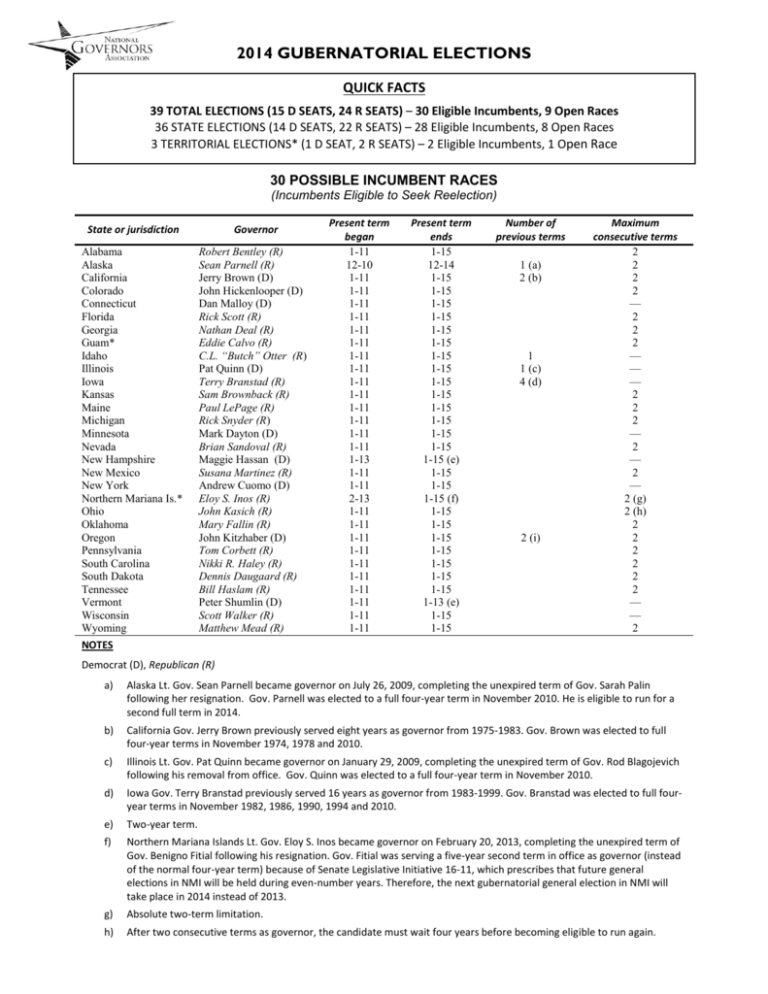
2014 GUBERNATORIAL ELECTIONS QUICK FACTS 39 TOTAL ELECTIONS (15 D SEATS, 24 R SEATS) – 30 Eligible Incumbents, 9 Open Races 36 STATE ELECTIONS (14 D SEATS, 22 R SEATS) – 28 Eligible Incumbents, 8 Open Races 3 TERRITORIAL ELECTIONS* (1 D SEAT, 2 R SEATS) – 2 Eligible Incumbents, 1 Open Race 30 POSSIBLE INCUMBENT RACES (Incumbents Eligible to Seek Reelection) State or jurisdiction Governor Alabama Alaska California Colorado Connecticut Florida Georgia Guam* Idaho Illinois Iowa Kansas Maine Michigan Minnesota Nevada New Hampshire New Mexico New York Northern Mariana Is.* Ohio Oklahoma Oregon Pennsylvania South Carolina South Dakota Tennessee Vermont Wisconsin Wyoming NOTES Robert Bentley (R) Sean Parnell (R) Jerry Brown (D) John Hickenlooper (D) Dan Malloy (D) Rick Scott (R) Nathan Deal (R) Eddie Calvo (R) C.L. “Butch” Otter (R) Pat Quinn (D) Terry Branstad (R) Sam Brownback (R) Paul LePage (R) Rick Snyder (R) Mark Dayton (D) Brian Sandoval (R) Maggie Hassan (D) Susana Martinez (R) Andrew Cuomo (D) Eloy S. Inos (R) John Kasich (R) Mary Fallin (R) John Kitzhaber (D) Tom Corbett (R) Nikki R. Haley (R) Dennis Daugaard (R) Bill Haslam (R) Peter Shumlin (D) Scott Walker (R) Matthew Mead (R) Present term began 1-11 12-10 1-11 1-11 1-11 1-11 1-11 1-11 1-11 1-11 1-11 1-11 1-11 1-11 1-11 1-11 1-13 1-11 1-11 2-13 1-11 1-11 1-11 1-11 1-11 1-11 1-11 1-11 1-11 1-11 Present term ends 1-15 12-14 1-15 1-15 1-15 1-15 1-15 1-15 1-15 1-15 1-15 1-15 1-15 1-15 1-15 1-15 1-15 (e) 1-15 1-15 1-15 (f) 1-15 1-15 1-15 1-15 1-15 1-15 1-15 1-13 (e) 1-15 1-15 Number of previous terms 1 (a) 2 (b) 1 1 (c) 4 (d) 2 (i) Maximum consecutive terms 2 2 2 2 — 2 2 2 — — — 2 2 2 — 2 — 2 — 2 (g) 2 (h) 2 2 2 2 2 2 — — 2 Democrat (D), Republican (R) a) Alaska Lt. Gov. Sean Parnell became governor on July 26, 2009, completing the unexpired term of Gov. Sarah Palin following her resignation. Gov. Parnell was elected to a full four-year term in November 2010. He is eligible to run for a second full term in 2014. b) California Gov. Jerry Brown previously served eight years as governor from 1975-1983. Gov. Brown was elected to full four-year terms in November 1974, 1978 and 2010. c) Illinois Lt. Gov. Pat Quinn became governor on January 29, 2009, completing the unexpired term of Gov. Rod Blagojevich following his removal from office. Gov. Quinn was elected to a full four-year term in November 2010. d) Iowa Gov. Terry Branstad previously served 16 years as governor from 1983-1999. Gov. Branstad was elected to full fouryear terms in November 1982, 1986, 1990, 1994 and 2010. e) Two-year term. f) Northern Mariana Islands Lt. Gov. Eloy S. Inos became governor on February 20, 2013, completing the unexpired term of Gov. Benigno Fitial following his resignation. Gov. Fitial was serving a five-year second term in office as governor (instead of the normal four-year term) because of Senate Legislative Initiative 16-11, which prescribes that future general elections in NMI will be held during even-number years. Therefore, the next gubernatorial general election in NMI will take place in 2014 instead of 2013. g) Absolute two-term limitation. h) After two consecutive terms as governor, the candidate must wait four years before becoming eligible to run again. i) Oregon Gov. John Kitzhaber previously served eight years as governor from 1995-2003. Gov. Kitzhaber was elected to full four-year terms in November 1994, 1998 and 2010. 9 D SEATS (9 states), 21 R SEATS (19 states, 2 territories) 9 OPEN RACES (Incumbents Not Eligible to Run, No Longer Eligible to Seek Reelection or Not Seeking Reelection) State or jurisdiction Arizona Arkansas Hawaii Maryland Massachusetts Nebraska Rhode Island Texas Virgin Islands* NOTES Governor Jan Brewer (R) Mike Beebe (D) Neil Abercrombie (D) Martin O’Malley (D) Deval Patrick (D) Dave Heineman (R) Lincoln Chafee (D) Rick Perry (R) John deJongh, Jr. (D) Present term began Present term ends Number of previous terms Maximum consecutive terms 1-11 1-11 12-10 1-11 1-11 1-11 1-11 1-11 1-11 1-15 1-15 12-14 1-15 1-15 1-15 1-15 1-15 1-15 1 (a) 1 2 2 2 2 — 2 (c) 2 — 2 (c) 1 1 2 (b) 3 (d) 1 Democrat (D), Independent (I), Republican (R) a) Arizona Secretary of State Jan Brewer became governor on January 21, 2009, completing the unexpired term of Gov. Janet Napolitano following her appointment as U.S. Secretary of Homeland Security. Gov. Brewer was elected to a full four-year term in November 2010. b) Nebraska Lt. Gov. Dave Heineman became governor on January 21, 2005, completing the unexpired term of Gov. Mike Johanns following his appointment as U.S. Secretary of Agriculture. Gov. Heineman was elected to full four-year terms in November 2006 and 2010. c) After two consecutive terms as governor, the candidate must wait four years before becoming eligible to run again. d) Texas Lt. Gov. Rick Perry became governor in December 2000 when Gov. George W. Bush was elected President. Gov. Perry was elected to full four-year terms in November 2002, 2006 and 2010. 6 D SEATS (5 states, 1 territory), 3 R SEATS (3 states) Revised August 11, 2014 For more information on governors and gubernatorial elections, visit www.nga.org/governors.


